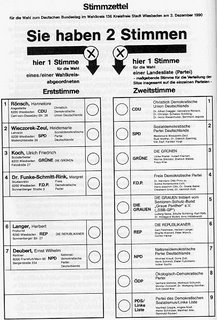In my previous post on this topic, I argued for adopting a mixed-member proportional (MMP) electoral system for Canada, and offered two reasons. More reasons follow below.

Third, although it is not necessarily an intrinsic part of MMP, the German variety provides for a 5 percent exclusion clause. German citizens have two votes, one for a local candidate representing a single-member constituency and another for a party list, as shown at right. Although many Germans split their votes, casting one for a deputy representing one party while voting for another party's list, they tend to cast both votes for the same party. If a party wins fewer than 3 single-member seats and less than 5 percent of the vote on the list side, it will receive no party-list seats at all. If, however, the party receives 3 or more single-member seats or succeeds in getting more than 5 percent of the list seats, it will receive the full number of seats to which it is entitled on the list side. The end result is a parliament that is roughly proportional, though not precisely so.
The reason for the exclusion clause is to prevent splinter parties and extremists from cluttering up the Bundestag. In the aftermath of the Second World War, when Germany had suffered through a dozen years of nazi misrule, a mechanism seemed necessary to prevent a resurgent national socialist party from entering parliament, as well as to put a premium on co-operation amongst would-be partisan groupings within the context of larger and more broad-based parties. This, it was hoped, would prevent the sort of cabinet instability plaguing the Weimar Republic between 1919 and 1933. More than half a century later, we can judge that MMP in Germany has been a success.
Admittedly, it has not succeeded everywhere. The Russian Federation has used a form of MMP since 1993, along with an exclusion clause. Unfortunately, because most political parties there tend to revolve around the personalities of local figures rather than around a programme commanding a nationwide following, up to half the electorate has gone unrepresented because their parties have not succeeded in surmounting the hurdle posed by the exclusion clause. As a consequence, next year's parliamentary elections will be contested on a straight party list system, which is almost certainly not appropriate for a country as large and diverse as Russia. We'll see how it works when the time comes.
Fourth and finally, MMP is more likely to be accepted within the North American context than, say, STV or a provincial/state party list system, as favoured by Skillen. Because single-member seats would continue to be contested, it would be less disruptive of something with which voters are by now thoroughly familiar. At this point, I would tend to favour dispensing with a party-list vote altogether and simply compensating with additional seats those parties with fewer seats than would be justified by their proportion of the popular vote. The end result would be not precisely proportional, but certainly more proportional than is currently the case. Little would change for the voters themselves, but they would know that, with their "losing" votes being combined to create extra seats, they would not be wasting their votes, as they effectively do now. This would almost certainly boost voter turnout in the two countries.
I might add that past editorials in The Globe and Mail have been on-side of adopting MMP here in Canada. Here in Ontario a Citizens' Assembly on Electoral Reform is getting off the ground, and public consultations are to be held. British Columbia went through a similar exercise, and a referendum last year came close to mandating the adoption of STV, largely through Nick Loenen's efforts.
I wonder, however, if it might be better for Ontario citizens to vote initially on the principle of PR versus FPTP, and then, if the former is approved, hold a second preferential ballot on the form of PR to be adopted. Some of the no votes in BC might have come from people who liked PR but disliked STV. Let's not make the same mistake here.
There is, of course, a possible drawback in adopting PR within the Canadian context, where we are accustomed to single-party "majority" governments that generally have the support of only between 38 and 43 percent of the electorate. Our last two governments have been single-party minority governments. If PR were adopted, we would probably never have another majority government again. Yet we could not keep having elections every year or so. This is where we reach the limits of institutional reform and where our developing unwritten constitution would have to fill in. Though we Canadians have had little experience with multiparty coalition governments, we would have to overcome our reluctance to see one party consorting with the "enemy" and consider this possibility. In fact, such coalition governments would be necessary if the political system as a whole is to continue functioning properly.
In the meantime, I plan to follow the work of the Ontario Citizens Assembly on Electoral Reform, and I may even make a submission.
No comments:
Post a Comment